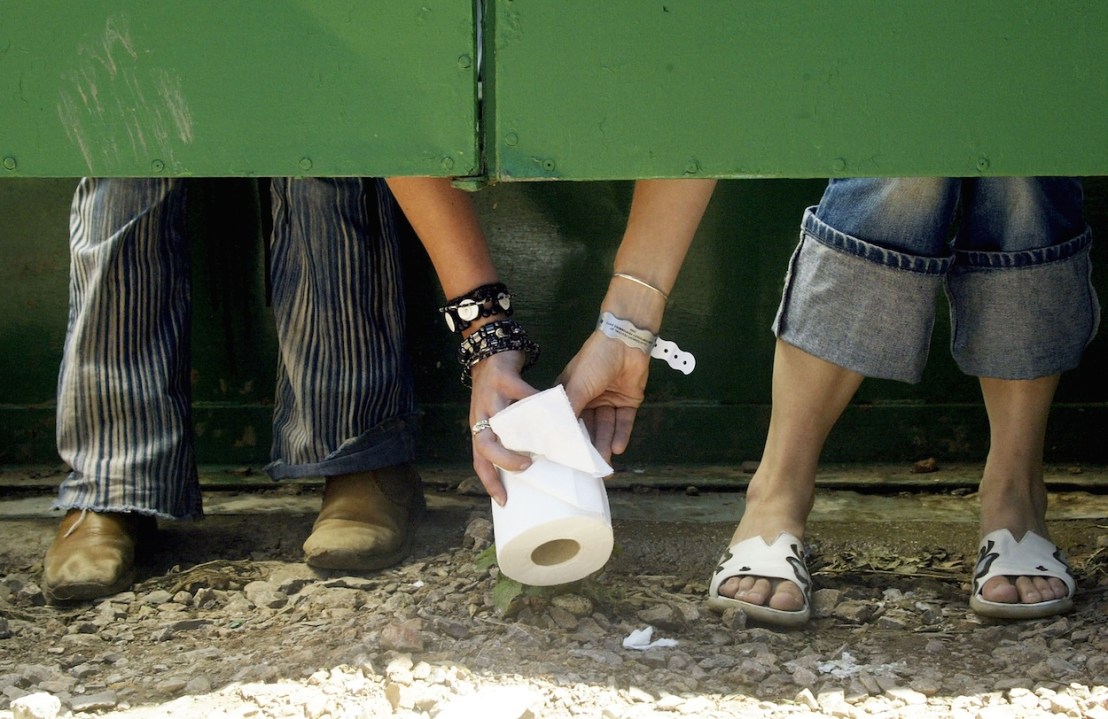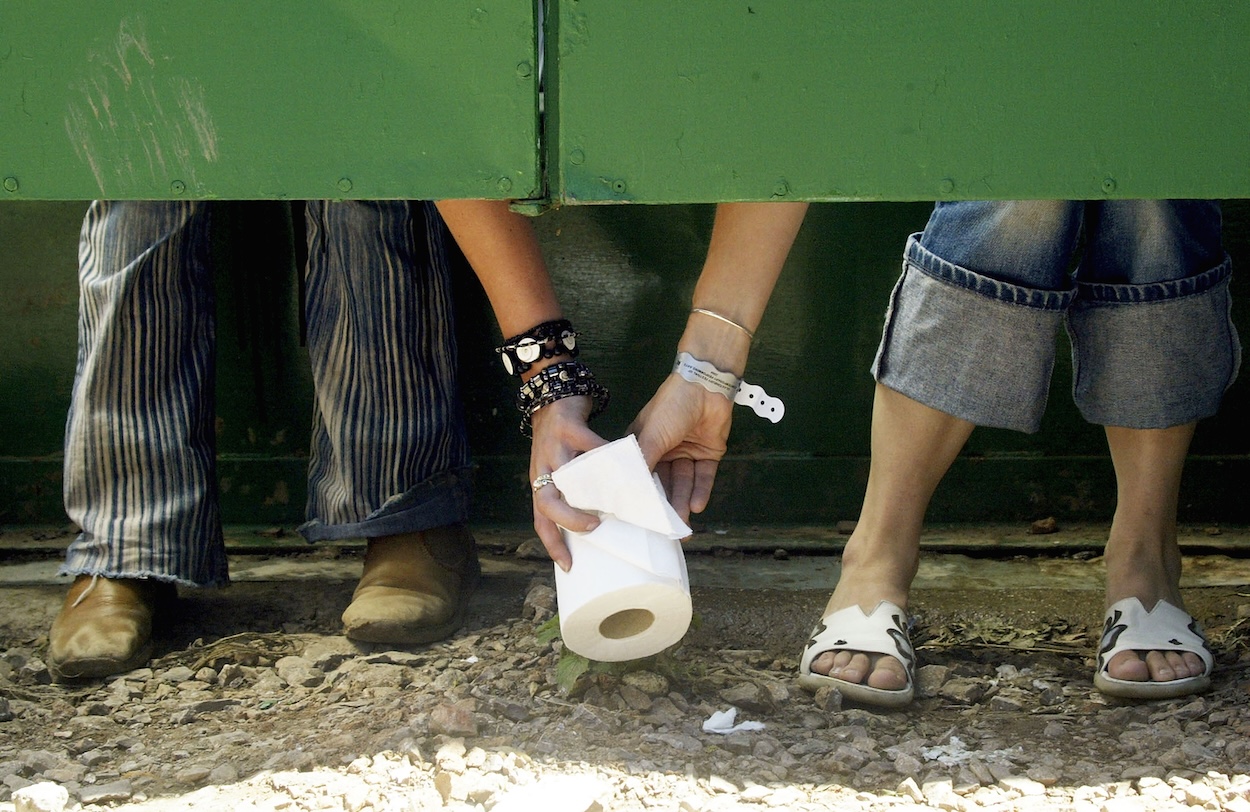On Sunday, I was in deepest Wales, listening to birdsong, braying donkeys and a demented cockerel, but instead of getting away from it all I was staring at three different laptops all clicked to the same link: the Glastonbury ticket sale countdown clock. This was the fifth year in which my daughter has sought tickets and, determined not to fail once again, she had arranged a military-style operation, recruiting a small army of volunteers, including me, to be online on the stroke of 9 a.m. in the hope that one of us would get lucky. The other five people she was planning to go with had all done the same. There must have been 50 people trying for the the tickets.
My daughter had arranged a military-style operation, recruiting a small army of volunteers
At first it was fun. There was considerable anticipation and some WhatsApp camaraderie: ‘How many bars have you got?’, ‘My friend’s friend just got through and got some,’ etc. But after half an hour, it wasn’t fun and hope was fading – and then it was gone completely. ‘Sold out’ signs appeared on all our screens. Desperately sorry that she had failed yet again despite all this determination and organisation, I went outdoors for a stroll to clear my head. As I walked along Welsh lanes, I reflected on my own first visit to Glastonbury, in 1985.
Tickets hadn’t been an issue then. My friend and I simply sent off a cheque with an SAE, and the tickets arrived by post a week or so later. They cost £17. On the Tuesday after I got back from that festival weekend, I had taken my driving test. I passed it. My father promptly added me to his car insurance and, aged just 18, I was suddenly mobile. A few weeks later I moved into a rented bedsit in pre-gentrified Chorlton in Manchester. It too was £17 – a week. I had gone there to study, on a grant, with fees covered by the state. A pint of beer in the student union bar was 45p. Bus fares were 10p.
All of these memories from that summer almost 40 years ago were in contrast to my daughter’s recent experiences. She too has recently passed a driving test, but I cannot afford the hefty insurance premium bump it would cost me to let her use my car. Rather than study for free, she recently graduated with debt in the vicinity of £50,000. Daunted by sky-high London rents, she is back living with her parents, wondering where her life is going in the longer term.
When I picked up that morning’s Sunday Times, I found myself reading in an article entitled ‘Young men and the unspoken grief of being childless’. This piece posited that declining birthrates are caused more by financial insecurity than infertility. ‘For a lot of these young men,’ Charlotte Ivers wrote, ‘the problem is economic. Many talked [to me] about the impossibility of buying a home of the type they grew up in. They are stuck in tiny flats, and who wants to give their children a less comfortable upbringing than they had themselves?’
A few days before this, I had read something else about this same age demographic in The Economist: ‘From April the threshold for paying back a student loan (£25,000) and the minimum wage on a full-time job will cross over. The result is that any graduate with a full-time job, whether that be stacking shelves in Tesco or training as a lawyer, will face a de facto marginal tax rate of at least 37 per cent.’
I bought my first home at the end of my twenties, a two-bedroom ex-council flat in Islington, for £67,000. Its value today would be more than ten times that. But the starting salary for the job I was in at that point is now actually lower than it was in 1996. Admittedly journalism is a particularly broken industry, so this last fact is not normal – but still, these numbers terrify me.
My first few years as a parent, I found myself about everything from the way my kids cross roads to swimming lessons. I tried to ensure they made friends, read books, did well at school, and had meaningful, stable lives. All this, only to discover that finally, when they’re safely into young adulthood, their prospects nevertheless look quite grim.
Despite gripes about the enduring class system, the UK half a century ago was approaching something close to meritocracy. But today’s house prices have returned us to a pre-Victorian world. Young people are either born with the prospect of inheriting sufficient equity to fund a desirable home or face being priced out forever, no matter how talented, high-achieving or hard-working they are.
Never mind affording a family – many of these young things may never be in a position to get a cat. So while missing out on Glastonbury tickets (now up from £17 and a stamp to £373.50 plus £5 booking fee) may not be a serious privation, it did make me realise just how demoralising it must be to be young. So small wonder they spend what money they do have on smashed avocado toast and exotic travel instead of mortgages they can’t obtain – and obsess about their mental health.
There was, though, a surprise happy ending to the Glastonbury ticket episode, I discovered when I got back from my Wales walk. One of her group had at the eleventh hour made it to the website’s checkout area and had managed to get six tickets after all – she was just too busy making sure she had all the details down right to tell anyone until after they had all given up hope. Whether she will ever get her own flat or pay off that student loans is another, bigger question.
This article is free to read
To unlock more articles, subscribe to get 3 months of unlimited access for just $5








Comments
Join the debate for just £1 a month
Be part of the conversation with other Spectator readers by getting your first three months for £3.
UNLOCK ACCESS Just £1 a monthAlready a subscriber? Log in